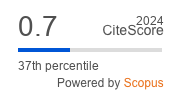The Association between CRP Levels with Comorbidities, Species, and Complications of Severe Malaria
DOI:
https://doi.org/10.47723/kcmj.v18i3.867Keywords:
C-reactive protein, severe malaria, hyperparasatemia, mortalityAbstract
Background: Malaria remains a leading cause of mortality in sub-Saharan Africa (including Sudan). C-reactive protein (CRP) is useful as a marker of severity in malaria. African studies have shown that serum CRP levels correlate with parasite burden and complications in malaria, especially falciparum. However, there are no data on CRP levels in Sudanese malaria patients.
This study aims to evaluate the association between CRP levels with comorbidities, species, and complications of severe malaria
Subjects and Methods: A cross-sectional study enrolled 65 severe malaria patients at Khartoum state hospitals during the period from April to June2021. Manifestations of severe malaria were defined according to WHO criteria. Data regarding demographics, presenting symptoms & signs, laboratory investigations, complications, length of hospital stay and outcomes were collected. CRP was classified as elevated when the measured level was >10 mg/l.
Results: Among 65 patients, 33(50.8%) were females and 32(49.2%) were males, and mean age was 48±21 years. The main manifestation of severe malaria diagnosis criteria was anemia in 26(40%) patients. Most of the patients had density 1+ (n=53; 81.5%) and were infected by P. falciparum (n=61; 93.8%). The overall case fatality rate for malaria was 8% (n=15 patients). The mean of CRP was 72±57 mg/L and 84% (n=55) of patients had elevated levels above 10 mg/L (ranged from 10-100 mg/L in 52%, and above 100 mg/L in 32%). The elevated CRP levels were significantly DM (P= 0.048), high malaria parasite density in blood film (P= 0.001), P. falciparum (P= 0.33), presence of complications (P= 0.001) and death (P= 0.003)
Conclusion: Elevated CRP levels were found in a considerable proportion of severe malaria patients. CRP is an effective biomarker in assessing malaria severity and poor prognosis in term of complications development and mortality.
Downloads
Published
Issue
Section
License
Copyright (c) 2022 AL-Kindy College Medical Journal

This work is licensed under a Creative Commons Attribution 4.0 International License.














